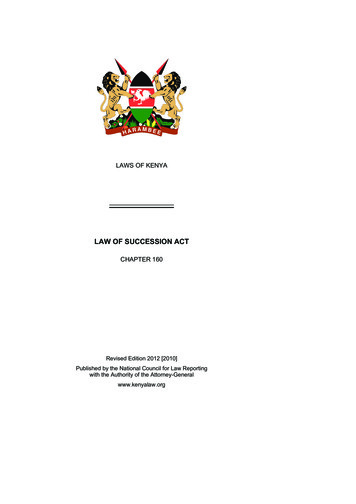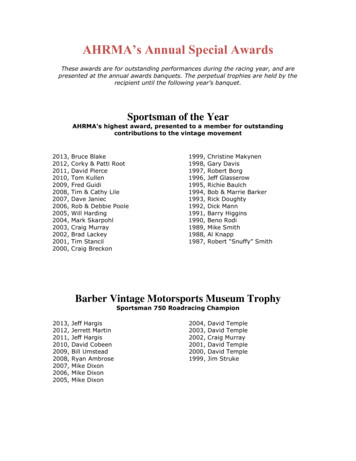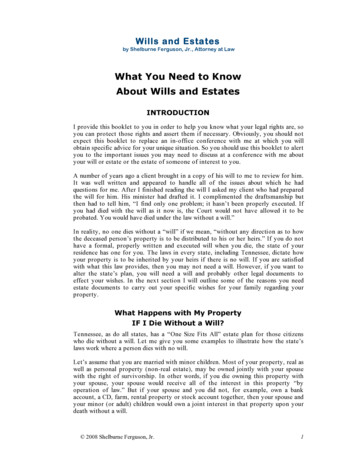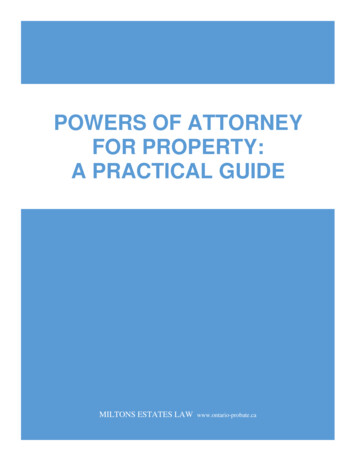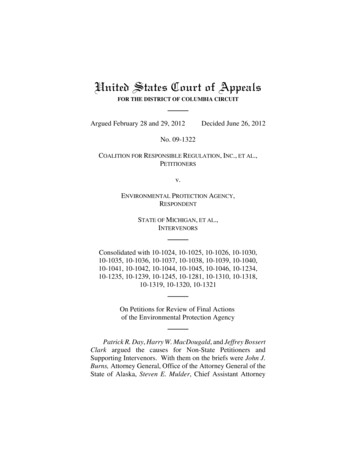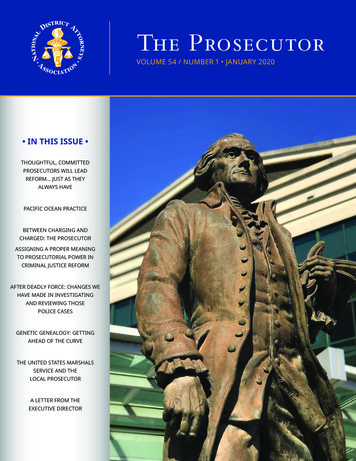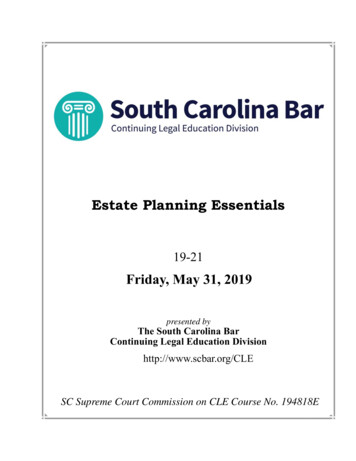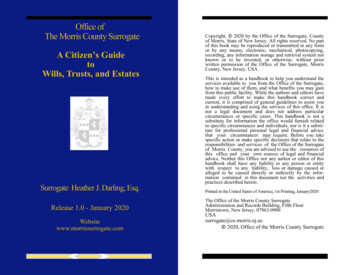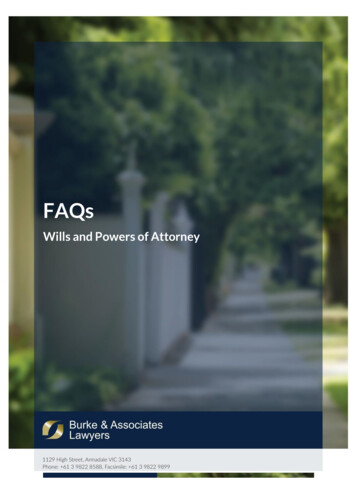
Transcription
FAQsWills and Powers of Attorney
Why do I need a Will?Your Will is an opportunity for you to have your say about what happens with your assets afteryou have passed away. A Will can be very flexible – appointing up to 4 Executors to manage andadminister the Estate, and leaving general or specific gifts to nominated beneficiaries. It can alsobe more prescriptive, as there are many people who make the most of the opportunity to 'rulefrom the grave'. It is important to discuss your objectives with a qualified legal professional, whocan explain the pros and cons of the different styles of Will, the practicalities in administeringyour Estate after you are gone, and to ensure that your objectives have legal effect.I don't have any assets – do I still need a Will?It's always a good idea to have a Will in place. Your Will can identify who you would like to be incontrol of what happens after you've passed away – for example, organising a funeral, whetheryou are cremated or buried, and what is written on the plaque or headstone. These types ofdecisions can often be the cause of conflict between loved ones, and it can be helpful tonominate the person (your Executor) who is entitled to make these decisions. Similarly, if youhave a Will in place, your Executor has control over what happens with your personal items,including photographs and other sentimental items.Also, often even if people don't have many assets, they may still have a superannuation fundwhich includes a default death benefit payment. If you haven't nominated a (valid) beneficiaryfor those death benefits, they pass to your Estate. Without a Will, the default legal positionapplies – see 'No Will, No Say a Guide to Victoria's Intestacy Provisions' for more information.The thought of making a Will seems overwhelming – is itcomplicated?Most of our clients comment that making their Will was much easier than they had expected itto be. Using an analogy, if you think your car may need to be serviced but you don't knowanything about mechanics, it would be quite a feat for you to know what to look for, and how tofix anything that had gone wrong. However, auto mechanics service and repair vehicles everyday, and all you need to do is drop your car in and leave them to it. Similarly, our experiencedWills & Estates team are specialised in the preparation of Wills. All we need from you is anoutline of what you would like to happen after your passing, and the information about yourfamily circumstances and asset holdings, and we can do the rest.What is a Testamentary Trust?A testamentary trust is a trust created within a testamentary document, such as a Will. It iscommon for people to include testamentary trusts in their Will if a beneficiary is likely to receiveat least 400,000 from their Estate, as it provides some asset protection and tax effectivenessin relation to the inheritance.FAQs – Wills and Powers of Attorney
Who should I appoint as my Executor?Your Executor is the person (or people) who are responsible for identifying your assets andmaking distributions in accordance with your Will. For more information about the role of theExecutor, see our Probate Guidance Fee Structure as at 1 July 2020You may nominate up to 4 people at a time to be your Executors, however fewer people is easierfrom a practical perspective. You may also nominate your Executors in a successive manner –that is, I appoint A, and if not A, then B and C.It is really important to consider any potential conflicts or issues which may arise in the courseof the administration of your Estate, and how well the beneficiaries get along with one another.A beneficiary can be an Executor, and in straightforward family situations, it may be preferableto keep the Executors and beneficiaries consistent. This has the effect of ensuring that theExecutor is acting in the best interests of the beneficiaries because they are one and the same.Where there are concerns about potential conflicts, or particular complexities, a trusted friendor advisor, or a professional (such as an accountant, lawyer or trustee company) may be worthconsidering. It is important to note that any Executor (whether a professional or a friend) maybe entitled to seek remuneration for the work undertaken as part of this role. This may besought either through:a) Explicit provision in the Will;b) Agreement between all of the beneficiaries; orc) An Order of the Court;and may be up to 5% of the total value of the Estate, depending on the value of the Estate andthe amount of work involved.Can an Executor named in a Will get paid in Victoria?Executors are entitled to be reimbursed for the reasonable expenses they incur, but in generalthey are not allowed to be paid for the time they spend in the role, unless:a) There is provision in the Will allowing for the payment of the Executor; orb) All of the beneficiaries of the Estate agree to the payment; orc) The Court agrees to the payment, on the basis of the Executor Commission provisionsof section 65 the Administration and Probate Act 1958 (Vic).It is important to note that this provision allows for up to 5% of the assets to be paid to theExecutor as commission, although the award may be less than this, depending on the workinvolved in the administration of the Estate.FAQs – Wills and Powers of Attorney
What is the difference between an Executor and aPower of Attorney?An Executor is the person (or people) you have named in your Will to manage your Estate afteryou have died. They do not have any power to act while you are still alive, as the Will does nottake effect until the death of the testator.An attorney nominated under Power of Attorney is generally appointed to act on your behalfwhile you're still alive. These are most commonly put in place to enable someone to makedecisions for you in case you lose capacity in the future. Subject to limitations you may wish towrite into the document, an attorney under a Power of Attorney can do anything on your behalfthat you can do for yourself or, if you've lost capacity: that you could do for yourself if you stillhad the capacity. However, as a person who has passed away can't do anything, this power stopswhen that happens, and the Executor takes over.Many people choose the same person(s)as their attorney(s) under Powers of Attorney and asExecutor(s) under their Will to ensure a smooth handover between incapacity and death,however, this is not essential.How much does it cost to have a Will prepared?The cost to have a Will prepared by a legal professional depends on the complexity of yourpersonal situation, as well as the structure of your ownership. When you are discussing yourWill with a lawyer, the lawyer should consider whether the asset forms part of your Estate to becovered by your Will, and whether there are any supplementary documents which need to bereviewed or prepared. For example, in general, jointly owned assets, superannuation, and assetsheld within trusts or private companies will not form part of your Estate and are not covered byyour Will. 'Estate Planning' is the term used to ensure that your asset structure is properlyidentified, and your objectives can be fulfilled within your Will and any relevant supplementarydocuments.A general price guide: Wills and Succession Planning Fee StructureCan I write my Will myself? Why can't I use a DIY WillKit?You can prepare your own Will, or get a Will Kit online or from the Post Office. However, we alltoo often see issues after a person has died caused by 'homemade' Wills. The issue may be thatthe Will was not signed properly, or there is ambiguity in the language used, or that the assetsbeing 'given' in the Will are actually not part of the person's Estate. Discussing your Will withan experienced legal professional ensures that your estate planning is more likely to beeffective, and you may find there are options available to you that you were unaware of. Alawyer will consider how your assets are held, and whether they are covered by your Will, and ifnot, may advise on how you can still achieve your objectives with supplementary documents orrestructuring during your lifetime.FAQs – Wills and Powers of Attorney
What assets may not be covered by my Will?It is important to discuss this with a professional (like us!), as some assets (and liabilities) may ormay not be covered by your Will, and we can determine this by reviewing your particularstructures and circumstances.In general:PERSONALLY OWNEDASSETSJOINTLYOWNEDASSETSSUPERANNUATIONTRUST OWNEDASSETSBUSINESS ANDCOMPANYOWNED ASSETSWhat Testamentary Capacity is required to make aWill?Anyone can make or change their Will provided they understand:a) what a Will is (i.e. a document setting out what is to happen to their property when theydie);b) what the Will is likely to cover (that is, the general value and type of asset);c) the effect of the Will they are putting in place; andd) the people who may reasonably consider themselves entitled to benefit from the Will,and any issue which may be likely to arise as a result of the Will.A medical opinion should be obtained from the person’s treating medical practitioner explainingthat the will maker has the required testamentary capacity to make a will, particularly if:a) the person making the Will is over 80 years of age;b) the person making the Will has health concerns or takes regular medication which mayimpact decision making;c) there may be a challenge to the Will; ord) if there are any other concerns that may arise, or reasons capacity may be questionedafter the person's death.FAQs – Wills and Powers of Attorney
I don't want my Will to be challenged – if I give someone 1, does that prevent them from challenging my Will?In short, No. Different jurisdictions (various countries and States) have their own rules aboutwho is eligible to challenge a Will. In Victoria, in general a Will can be challenged by a domesticpartner, child, financial dependent or member of your household if they consider that you havenot provided them with enough financial support from your Estate.Whether or not a person is eligible to challenge your Will is based on the laws of the relevantjurisdiction, and it is worthwhile checking with a qualified legal professional to confirm whothese people may be in light of your specific personal circumstances.If someone is eligible, there are a number of factors to consider in relation to their likely success,such as the value of the Estate, their financial need, your relationship with them, and thecompeting needs of other beneficiaries of your Will.If my Will can be challenged, what's the point of makingone?In some cases, careful estate planning, in consultation with a specialist, can minimise the risk ofa challenge, so discussing your objectives and concerns with a legal professional may be helpful.Even where the risks cannot be completely mitigated, it is still important to put a Will in place.Without a Will, your assets will be distributed in accordance with the intestacy provisions whichare unlikely to be consistent with your objectives if you are concerned about a possiblechallenge. If you have a Will in place, the gifts you have outlined will take place unless:e) There is a challenge; andf) The challenge is successful.Although challenges are often talked about, they are actually relatively uncommon, and in thelarge majority of cases, the Will is administered without a challenge.If there is a challenge, the Will is the 'starting point' for negotiations. The Courts doacknowledge 'freedom of testation' -that people should generally have the right to decide howtheir assets are distributed upon their death – and this is interfered with only when cause isshown.What if I'm living in a de facto relationship and I diewithout a Will?If your partner can satisfy the legal requirements proving the relationship, they may be entitledto share in your estate on your death. The necessity of proving the relationship can result inadditional expense and distress at a time when they are grieving. It is much easier to draft a Willnaming your partner as a beneficiary.FAQs – Wills and Powers of Attorney
How often should I update my Will?Your Will expresses your wishes at a particular point in your life. It is advisable to regularlyreview your Will as your circumstances change so that it reflects your current wishes.Situations we recommend updating your Will: MarriageSeparation and or divorceStarting a de facto relationshipDeath of a spouseHaving children or grandchildrenYour children having remarried or divorced and have extended familiesThe executor named in the Will, having become ill, is unable to handle the responsibility,or has diedA beneficiary named in the Will having diedRetirement often results in people restructuring their affairs. This is an ideal time to beproactive in your estate planning.When you buy or sell assets. There are many examples of people bequeathing assetswhich they sold before they died. This resulted in some beneficiaries receiving nothing,while others received significantly more than was intended in the original Will.We recommend that you review your Will at least every five years or, earlier, if you havesignificant changes to your circumstances (such as marriage, death, estrangement, divorce orchildren).Does getting married or divorced affect my Will?If you marry after you have made a Will, the Will is generally revoked, unless it was made inanticipation of marriage. Marriage will not affect a gift to the person who is your spouse at yourdate of death. If you divorce after you make your Will, it only revokes or cancels any gift to aformer spouse.If I own assets overseas do I need to make a separateWill?If you own assets of financial value overseas we recommend you make a separate Will dealingwith those assets, rather than having one Will expressed to deal with all assets.The inheritance laws in other countries may be significantly different to those in Australia. Somecountries have laws that result in certain family members being automatically entitled to aspecified share in your estate regardless of the terms of your Will.There may be laws regarding who may contest your Will and taxation laws that may impact yourestate and your beneficiaries. There may even be different requirements for the execution of avalid Will.In 2015 Australia became a signatory to an International Convention in relation to internationalwills. Not all countries are signed up to the Convention, but for those countries that have signedup, there is a standard form of Will that will be accepted as a validly executed Will. However,the law in each country still applies in respect of the administration of the estate and so issuesmay still apply.FAQs – Wills and Powers of Attorney
Wills & Estates team are specialised in the preparation of Wills. All we need from you is an outline of what you would like to happen after your passing, and the information about your family circumstances and asset holdings, and we can do the rest. What is a Testamentary Trust? A testamentary trust is a trust created within a testamentary .
